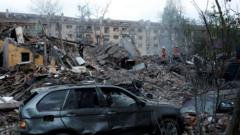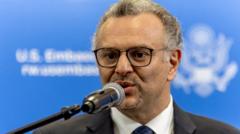Ukrainian President Volodymyr Zelensky remains adamant against any peace plan recognizing Russian control over Crimea, a stance deeply rooted in the sentiments of his constituents and the political landscape.
Zelensky's Stance on Crimea: Political Reality vs. Peace Effort

Zelensky's Stance on Crimea: Political Reality vs. Peace Effort
The Ukrainian President insists on not conceding Crimea, reflecting domestic pressures and the complexity of ongoing negotiations.
In the wake of a proposed peace plan from the Trump administration which would acknowledge Russia's claim over Crimea, President Zelensky firmly rejected the idea, emphasizing that it would contradict Ukraine's Constitution. He affirmed that even for the sake of ceasing the brutal conflict, such a concession is off the table. "It would never happen," Zelensky declared to reporters, highlighting the entrenched emotions surrounding the issue.
The political ramifications within Ukraine complicate this matter significantly. The populace harbors intense memories and resentments regarding Russia’s annexation of Crimea, creating an environment where formal recognition of Russian authority in the region could be seen as a grave betrayal. This sentiment could jeopardize not only political careers but also the hopes of many families separated during the 2014 occupation, where some fled into Ukraine while others remained.
In a statement that underlines the political pressure Zelensky faces, Kostyantyn Yeliseyev, a former aide, stated, "There is not a single Ukrainian politician who would vote to legalize the occupation of Ukrainian territories," describing such an act as tantamount to political suicide for any parliament member.
Exacerbating the situation, former President Trump expressed frustration at Zelensky's stance, remarking on social media that Crimea was "lost years ago" and suggesting the Ukrainian leader was risking prolongation of the conflict over unrealistic expectations. Trump offered a stark choice: "He can have Peace or, he can fight for another three years before losing the whole Country."
In this volatile climate, Zelensky’s refusal to acquiesce to Russia's demands underlines his commitment to Ukrainian sovereignty but also exposes the significant challenges facing his administration as it navigates the desire for peace amid calls for national integrity.
The political ramifications within Ukraine complicate this matter significantly. The populace harbors intense memories and resentments regarding Russia’s annexation of Crimea, creating an environment where formal recognition of Russian authority in the region could be seen as a grave betrayal. This sentiment could jeopardize not only political careers but also the hopes of many families separated during the 2014 occupation, where some fled into Ukraine while others remained.
In a statement that underlines the political pressure Zelensky faces, Kostyantyn Yeliseyev, a former aide, stated, "There is not a single Ukrainian politician who would vote to legalize the occupation of Ukrainian territories," describing such an act as tantamount to political suicide for any parliament member.
Exacerbating the situation, former President Trump expressed frustration at Zelensky's stance, remarking on social media that Crimea was "lost years ago" and suggesting the Ukrainian leader was risking prolongation of the conflict over unrealistic expectations. Trump offered a stark choice: "He can have Peace or, he can fight for another three years before losing the whole Country."
In this volatile climate, Zelensky’s refusal to acquiesce to Russia's demands underlines his commitment to Ukrainian sovereignty but also exposes the significant challenges facing his administration as it navigates the desire for peace amid calls for national integrity.





















